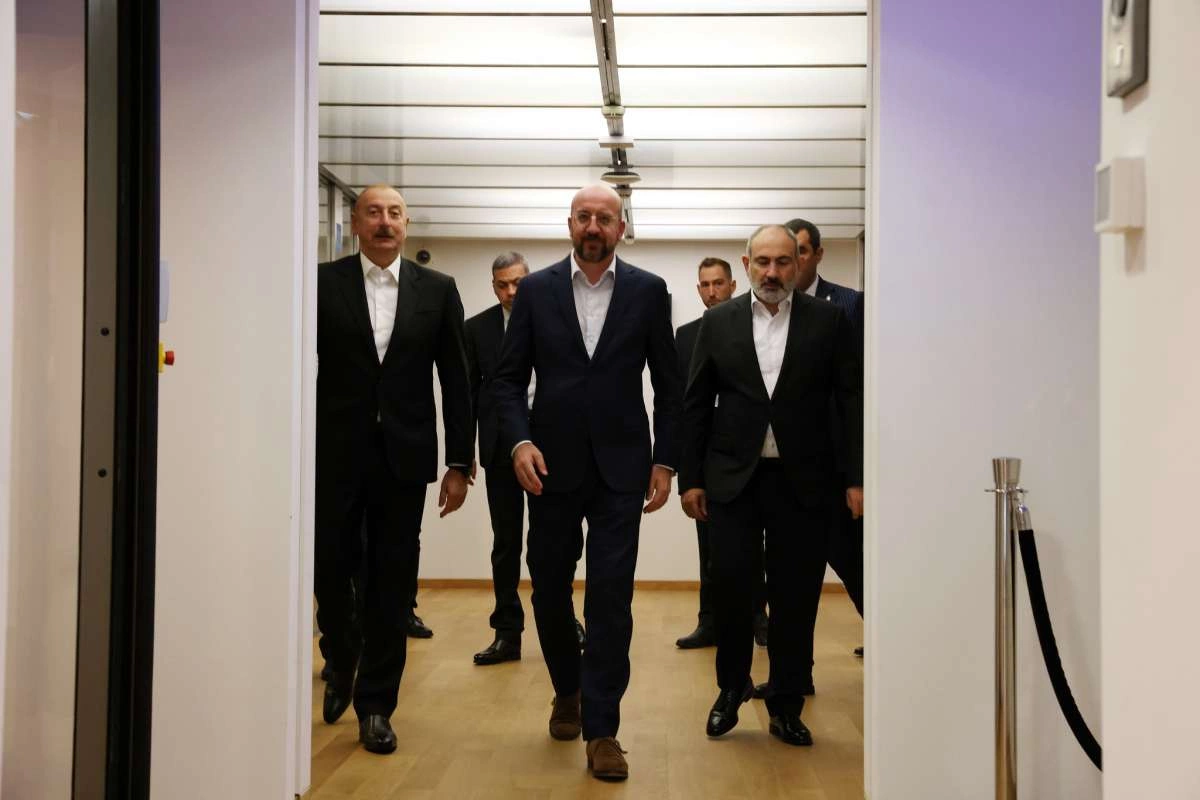
While Aliyev and Pashinyan’s latest Brussels meeting marked a fairly unremarkable continuation of their slow, steady progress towards an eventual peace treaty, Moscow’s reaction was an unexpected change of posture regarding their on-the-ground peacekeepers.
Image: European Union
On Saturday (15 July), EU Council President Charles Michel hosted, for the 6th time, a meeting between Azerbaijani President Ilham Aliyev and Armenian Prime Minister Nikol Pashinyan. In a statement immediately afterwards, Michel characterized the Brussels exchanges as being, once again, “frank, honest, and substantive.” He said that he had noted an “important momentum” and commended both leaders for their “strong commitment to the peace process” while calling for “further courageous steps to ensure decisive and irreversible progress on the normalization track.”
Though neither Aliyev nor Pashinyan commented to reporters, based on Michel’s press briefing, the meeting covered seven main themes—perhaps most interestingly on building the much discussed cross-border railway connection along the Araz Valley. Michel said that positions on this issue are “now getting closer and options are being actively explored” and that he felt that construction should be “undertaken forthwith” with the EU “ready to contribute financially.”
Michel also “expressed the EU’s encouragement for direct dialogue between Baku and representatives of Armenians living in the former Nagorno-Karabakh Autonomous Oblast” to “provide much-needed confidence for all those involved.”
On borders, both sides reportedly re-iterated a commitment to the 1991 Almaty Declaration as a political framework for border delimitation and their respect for each other’s territorial integrity based on the definition by which Armenia and Azerbaijan have accepted areas of approximately 29,800 and 86,600 square kilometres respectively.
Perhaps the most interesting news around the talks, however, came not from Brussels but from an official statement issued by Russia’s foreign ministry. As a preamble to suggesting that Moscow should be hosting future Azerbaijan-Armenia normalization meetings, the statement made the following highly unexpected comments in reference to Yerevan’s public acceptance of former Nagorno Karabakh being part of Azerbaijan’s 86,000 square kilometers:
“We respect the sovereign decision of the Armenian leadership, however, this radically changes the fundamental conditions under which the Statement of the leaders of Russia, Azerbaijan, and Armenia of 9 November 9 2020 was signed, as well as the position of the Russian peacekeeping contingent deployed in the region. We believe that under these conditions, responsibility for the fate of the Armenian population of Karabakh should not be shifted to third countries. It is necessary to immediately start preparing a peace treaty between Baku and Yerevan, based on previously reached agreements.”
This is a slightly convoluted way of saying that Armenia, rather than the Russian Peacekeepers, should now be responsible for overseeing the security of the Karabakh Armenians. This suggestion was described by long-term Caucasus observer Joshua Kuchera as “disingenuous (to be mild), as no one officially, even Armenia, ever formally recognized Karabakh as anything other than Azerbaijan.”
While this could be seen as the Kremlin simply making a new bid to push talks back into a Moscow-led orbit, as Kuchera says, the newly stated position could be alternatively read as a “pretty bald abdication of the Russian peacekeepers' duties in Karabakh.”
Baku responded to the Russian statement by saying that it “causes disappointment and misunderstanding.”
Share on social media